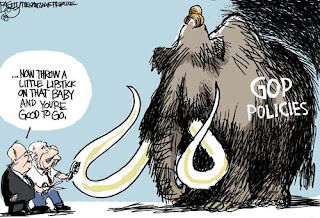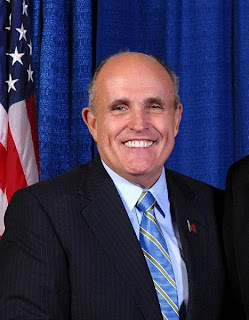
This article by CBS news' Sean Alfano provides an excellent commentary of how the Democrats won in 2006.
















When we consider the year 2008, and what an amazing year it was for Politics, it is important to consider that, for many of the candidates; the race began much earlier than that. Barack Obama, for example, started eulogizing about a run in October 2006! And John Sidney McCain III declared his candidacy as early as February 2007, in New Hampshire, where McCain is formally known as "The Maverick" for his fantastic showing in that state in 2000 against "Dubya".
Of course it's important to remember that, back then, the main issue was the war in Iraq. And initially, on the Republican side [although I'm sure many will have forgot this] Rudy Giuliani was the early frontrunner, despite his pro-gay rights and pro-abortion views antagonizing much of the far right. Despite an endorsement from Pat Robertson, one of America's most crazed, fanatical evangelicals, Giuliani's risky, Las-Vegas style campaign strategy of not showing the cards in his hand until Florida proved disastrous, absolutely disastrous, and embarrassing. Did I say disastrous!? He spent roughly $40 million and never even carried a state. What a complete and utter joke of a candidate, surely the 2008 election's equivalent to the Detroit Tigers....??????? Ultimately, the Republicans countered the Democratic ticket by selecting the most experienced candidate in the race, McCain, though doubts over his age and potential longevity in office lingered among many on the right, left, and centre.
On the Democratic side, Hillary Clinton was the early frontrunner - she had more name recognition than the then candidate Senator Barack Obama n co. However, with Edwards winning Iowa, it gave others in the democratic ticket legitimate hope that an upset could be on the cards. Clinton proceeded to rebound strongly in New Hampshire (do we all remember those infamous, FAKE, tears...?) but really lost her way after "Super Tuesday" when Obama carried [something like] 11 states in a row. She then resorted to cheap, gutter-snipe politics and her public support continued to wane, eventually deteriorating, and Obama's campaign slogan of "Change we can believe in" really hit the nail on the preverbal head.
Then, out of the blue – the Alaska blue skies to be exact, came Mrs. "YOU BETCHA" - Sarah Palin. A successful governor in a large, yet isolated state in Alaska, she proved to ultimately be a laughing stock for the Republicans - though initially energizing the base - her inability to define the Bush doctrine or name a national newspaper really left her a sitting duck for the media "gotcha" giants like MSNBC, CNN, and somewhat surprisingly, FOX.
Then in September, all hell broke loose. The economy plunged south faster than a bat out of hell, and many conservative-leaning middle class Americans began to think with their wallet, not their so called "value system". Obama's economic populism resulted in a spiking in his poll/approval ratings across the country, and he even came close to beating McCain in his home state of Arizona, whilst taking previous Republican strongholds like Nevada and Colorado, ultimately - the “Joe The Plumber” mentality is really what sealed the final nail in McCain's political coffin. McCain tried to pretend to be in touch with the average American, while at the same time trying desperately to keep his lavish lifestyle and [multiple?] houses out of the newspapers. Obama's lower-middle class upbringing, meanwhile, did him a world of good.
The rest, as they say, is history...


With regards to factions and financing, there is absolutely no doubt that factions play a role in politics. Federalist 10 was very clear about the reality of what factions are and how they can damage the goal of the party and hence damage and tarnish the image of the country. I am going to define the word faction :
"cabal: a clique (often secret) that seeks power usually through intrigue"source = http://wordnetweb.princeton.edu/perl/webwn?s=faction
When it comes to American politics, that definition certainly sounds familiar doesn't it (i.e. special interest groups, lobbying, etc..)? In truth, I think the overall idea of Campaign Finance Reform is positive but implementing it is another story. Implementing laws that limit the individual contribution of personal donors to $2000 and PAC to $5000 is a solid start, nonetheless, there's no guarantee this will root out all of the dirty money in politics. What's to stop wealthy individuals from special interest groups (i.e. NRA, Board of Education) from giving out money to others in order to provide the money to the candidates? The IRS? Give me a break.
